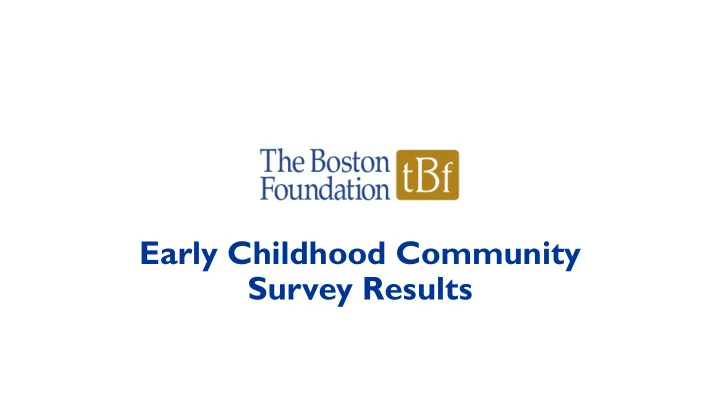

Early Childhood Community Survey Results
Goals of TBF’s Community Survey • Gather input from experts and practitioners in the early childhood field • Enhance our understanding of the current landscape, especially the existing and potential cross-sector partnerships in the field • Enhance our understanding of the needs and opportunities in the early childhood field
Survey Respondents University/Acade mia 10% School System • Represent 67 5% CBO - Family organizations in Serving Philanthropy 32% Greater Boston 5% • Many work at Library/Museum 5% community based Government 3% organizations Advocacy (CBO) serving only 3% children or families Hospital/Health Center CBO - Child 13% Serving 12% Child Care Center 12%
Boston Neighborhood Maps Neighborhoods Served by Survey Respondents Neighborhoods Served by Early Childhood RFP Applicants
Survey Question 2 I s your organization part of a cross-sector partnership?
Cross-Sector Partnerships More than half of respondents who partner in their work do so in large partnerships. Child care centers and family- serving organizations are the most common sectors selected as partners, followed by health centers and hospitals.
Survey Question 16 From your needs assessment … what were the greatest needs identified as critical to the lives of young children and their families in your geographic catchment area?
Based on your Needs Assessment: Greatest Needs T op Greatest Needs Frequency Selected Open Responses • “…A significant number of classrooms would benefit from additional funding and professional development. In addition…infant/toddler classrooms and family child care High quality early childhood 16 homes continue to lag in quality. Our youngest children need care and education early care and education that supports their optimal development.” • “B etter collaboration between health providers and educators is a critical need in Boston” Improved Service 12 • “Our city's children deserve a coherent coordination as to Coordination who is doing what, with whom in order for equitable access to well- funded resources such as public and school libraries” • “ There is a need for enhanced continuity of care--with better supports for parents between jobs, parents with opportunities to earn more money, and others who risk losing access to Parent Support 9 care for various administrative reasons”
Additional Needs in Early Childhood “Preventative mental health Greatest Needs (Continued) Frequency services for young children and their families AND staff support for Access to care/education 8 all providers touching young children” Address Mental Health/Trauma 8 “Meaningful professional Early Childhood Workforce: development/coaching/mentoring/tr Compensation & Professional 6 aining/livable wages/career planning Development for early childhood educators .” Literacy Support 6
What existing barriers prevent families from accessing services?
Top Existing Barriers to Services T op Barriers Frequency Selected Open Responses • “Lack of affordable high quality early childhood programming lack of affordable professional development and • Cost and quality of early education opportunities for early childhood childhood programs and 12 educators; care • high turnover within the early education workforce due to low compensation and limited advancement opportunities.” • “Need leadership, advocacy and financing for early Mental health support for childhood mental health services and an informed 11 both children and families approach to primary prevention buffering trauma and toxic stress” “The prevalence of service models that only address • a small part of the overall challenges a family Services operating in silos 10 experiences and who operate in a silo from other services designed to help the very same family.”
Additional Barriers to Services “One piece families are lacking is Barriers (Continued) Frequency access to quality year-round, full-day early childhood education. If children Access to care/resources 9 are in centers where staff have the Parent’s time and lack of job 8 tools, resources and support they flexibility need, they will have access to the Parental knowledge 6 services they need or [be] referred to the appropriate agencies .” Transportation 6 Housing 3 “People in power do not believe that Racism 3 families are capable and want what is best for the children and constantly Lack of funding support 2 undermine their abilities .”
How does this data impact your thinking as you consider refining your proposals?
Survey Question 20 What are the greatest needs or opportunities in early childhood?
Greatest Needs and Opportunities EC Workforce: Prof Dev & Comp 5% 2% 2% Improved Service Coord 5% Parent Support 4% 32% Access to Care/Ed Out of 51 7% total Family Centered Approach responses 11% Address Mental Health/Trauma 16% High Quality Care/Ed 16% Housing
Greatest Needs and Opportunities T op Needs/Opportunities Frequency Sample Open Responses • “ Resolving the early education workforce crisis. The turnover rate among pre-school teachers in Massachusetts is above 30 percent, which is largely the result of grossly inadequate compensation. The average salary for a community-based Early childhood workforce: pre-school teacher is below $13/hour, which equates to an professional development & 14 annual salary of approximately $25,000 — only $700 above compensation the federal poverty level for a family of four. Raising the reimbursement rate will help early education agencies to address this issue.” “The greatest need and the greatest opportunity is to build a • strong network of support for families that includes health Parent support 7 services, neighborhood safety, economic security and education for both parents and children.” “There is a need for increased coordination and evaluation of • various home visiting programs--to help reach all children Improved service coordination 7 who can benefit with home visiting, reduce overlaps and identify which models work best for which type of child.”
Summary of Top Barriers and Needs T op Barriers T op Needs/Opportunities Early childhood workforce: Cost and quality of early childhood professional development & programs and care compensation Mental health support for both Parent support children and families Services operating in silos Improved service coordination
Thank you to everyone who completed this survey. Your feedback is greatly appreciated.
Recommend
More recommend